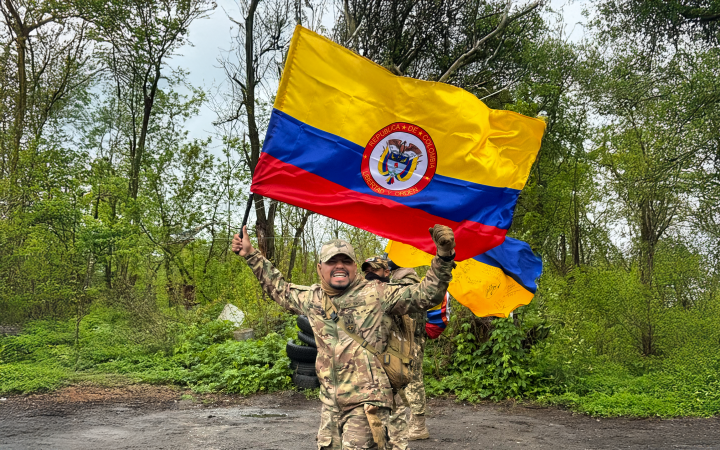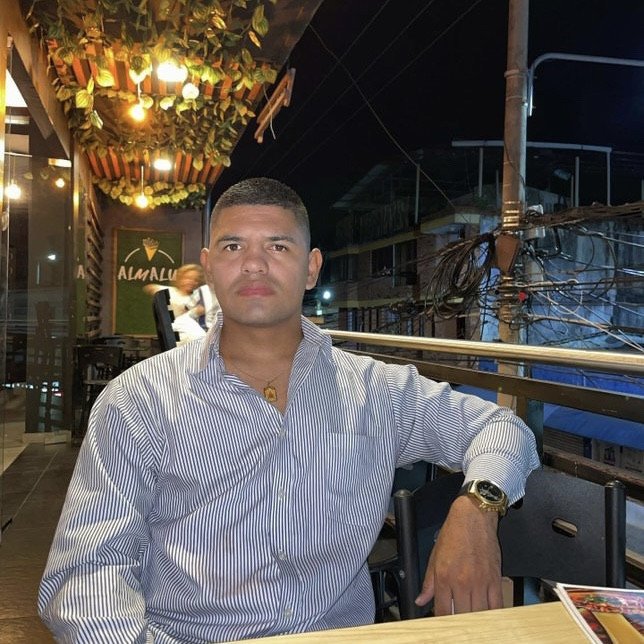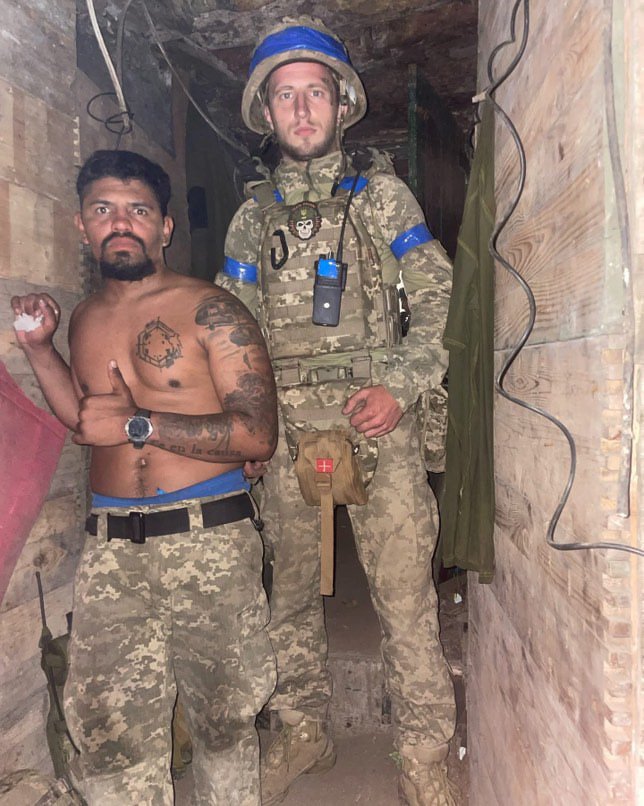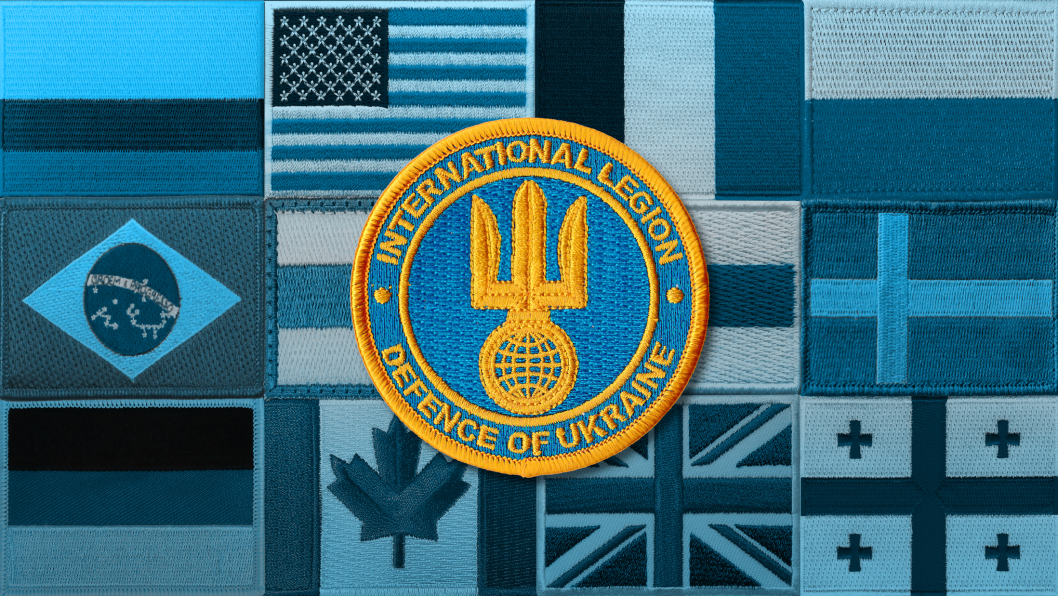- Category
- War in Ukraine
Colombian Volunteers Fight Alongside Ukraine, Bringing South American Valor to Eastern European Resolve
-580ccdc2853d64ca18128939bc98e84e.png)
An unexpected trend has emerged in Ukraine’s Foreign Legion—a surge of Colombian fighters. What draws them across the world to fight for Ukraine?
It’s the Friday before Christmas and this infamous ex-pat watering hole in Kyiv is brimming with soldiers on leave. The air is thick with sweat and cigarette smoke and the sound of the band drowns out any chance of meaningful conversation. The scene harkens back to the wartime camaraderie of World War II: athletic young men sporting crew cuts with biceps bulging beneath tight shirts. But there’s a twist– the music isn’t Frank Sinatra, it’s a five-piece Latin band playing cumbia, and instead of whisky, the drink of choice is tequila.
The global south answers Zelenskyy’s call
Since the full-scale invasion began, foreigners from around the world have answered Ukrainian President Volodymyr Zelenskyy’s call to fight for Ukraine. While many come from the country’s more conventional allies like the United States and the United Kingdom, a surprisingly large contingent has arrived from the global south, particularly South America.

On this particular night, in this particular bar, Colombian members of the Foreign Legion gather to blow off steam between stints on the frontlines. For the holidays, rather than returning home, these soldiers have opted to rent Air Bnb’s and explore Ukraine’s historic cities, like Kyiv and Lviv. The atmosphere in the subterranean dive bar is festive. Soldiers buy each other drinks and slap one another on the back, while the local girls shriek with delight as these Colombianos whirl and twirl them across the dance floor. Culture–and probably a few phone numbers–are being exchanged. This “party like there’s no tomorrow” ethos often pervades warzones, where tomorrow is never promised.
“Many of us came for different reasons,” says Jhoe Manuel Almanza, call sign Dragon, a Colombian soldier in his early 30’s. “For me, it was about living a unique experience and being part of something bigger– being a part of history.” He explains that most Colombians rarely leave their country. “I wanted to see the world, to learn.” Fighting for Ukraine gave Almanza an opportunity to combine his military background with his desire for travel.
Guerilla tactics vs. high-tech warfare
In Colombia military service is mandatory for men aged 18-50. Men typically spend 12 to 24 months in service, though many, like Almanza, choose to stay longer as a career. This widespread military experience makes Colombians uniquely suited to assist Ukraine. However, as Almanza explains, the battles they face here are quite different. “In Colombia, it’s more guerilla-style fighting with limited resources,” he says. “In Ukraine, the fighting is much more advanced, with the artillery, drones, and organized positions. In Colombia, you might just attack directly, but here, you secure a position with artillery and then move in cautiously.”
@united24media.com Colombian volunteers fight alongside Ukraine Source: 241 Brigade / Jhoe Manuel Almanza
♬ som original - 𝐘𝐜𝐚𝐫𝐮𝐮𝟕𝟕 - 𝐘𝐜𝐚𝐫𝐮𝐮𝟕𝟕
For Almanza, this style of warfare aligns more closely with the visions that first inspired him to join the military as a young man. “The trenches and positional warfare remind me of World War II,” he says. “But the use of drones and modern technology makes it different.”
Sacrifice and support
While Almanza is thrilled with his new life in Ukraine, his family back in Colombia have gone through their own emotional rollercoaster. “At first, they didn’t agree,” he says. “My mother especially didn’t want me to go because of the dangers. But eventually, they supported me in their own way. Some friends helped with money so I could make the trip here.” Almanza says he plans to stay in Ukraine after the victory and hopes to buy a house and settle down.
Ukraine offers competitive salaries to foreign soldiers who sign military contracts. Almanza notes that the average monthly salary for a frontline soldier is around 120,000 hryvnias (about $2,834). By comparison, he says a Colombian soldier earns about $350 per month. “The pay is better than what I could earn in Colombia,” he says. With his earnings, Almanza supports his mother and extended family back home.

Hidden struggles
Life as a foreign soldier in Ukraine isn’t without its challenges. “It’s tough but fulfilling,” says Almanza. Behind the valor lay the harsh realities of war. “Of course, the risk is high, and I’ve lost companions,” he admits.
Before his break, Almanza suffered a hand injury that made it difficult for him to operate his weapon. In early January, he traveled to Ternopil for physical therapy at one of Ukraine’s military hospitals – services fully covered by the Ukrainian government. This support extends to all soldiers, foreign and Ukrainian alike. In the unfortunate event of death, the government also provides compensation to the families of fallen foreign fighters.
Carlos Molina, a former Captain in the US Marines whose family hails from Colombia, has been working for months to assist Spanish-speaking soldiers in Ukraine. The biggest hurdle, he says, is language. “Problems come in many shapes and forms,” explains Molina. “They’re frustrated because when they have a problem, they have no one to talk about it with.” While many Ukrainians speak English, few speak Spanish. For soldiers who don’t know English, communication becomes a significant challenge. To address these challenges, the Foreign Legion has brought in Spanish-speaking trainers, a full-time Spanish-speaking support team, and even created a Spanish-language version of its website.

The absence of a Colombian embassy in Ukraine further complicates matters. Molina shares the story of an injured soldier who lost his passport. Without a Colombian embassy, the soldier must leave Ukraine to replace it. Molina believes a centralized office dedicated to foreign soldiers could resolve many of these issues. “They’re missing a bridge, a place where they can bring their problems,” he says.
Building bridges that outlast the war
Despite these hardships, foreign soldiers have proven themselves on the battlefield. Many Ukrainian troops praise their foreign counterparts for their dedication and unique perspectives.
“Foreign volunteers are here because they want to be here,” says Andrii, a soldier from Ukraine’s 25th Airborne Brigade. The diverse composition of Ukraine’s Armed Forces, blending Ukrainian and foreign fighters, is forging global ties that will endure beyond the war.
“Colombia is a democracy, and many Colombians sympathize with Ukraine because of the shared desire for freedom,” says Almanza. He notes that while Colombians often disagree on domestic politics, there is widespread admiration for Ukraine’s fight for independence.

-fca37bf6b0e73483220d55f0816978cf.jpeg)
-35249c104385ca158fb62273fbd31476.jpg)


-554f0711f15a880af68b2550a739eee4.jpg)



-206008aed5f329e86c52788e3e423f23.jpg)